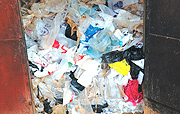It is now seven years since the Rwanda Environment Management Authority (REMA) ordered the crack down on the use of polythene bags. It also ordered officials at Kigali international airport and the country’s borders points to be on the look out and confiscate polythene bags from those traveling into the country. Innocent Gashugi, an Environment Impact Assessment officer, said on Tuesday, that the war against polythene bags is on course.


It is now seven years since the Rwanda Environment Management Authority (REMA) ordered the crack down on the use of polythene bags.
It also ordered officials at Kigali international airport and the country’s borders points to be on the look out and confiscate polythene bags from those traveling into the country.
Innocent Gashugi, an Environment Impact Assessment officer, said on Tuesday, that the war against polythene bags is on course.
"We have largely succeeded. People are beginning to see why it is not good to use these polythene bags,” Gashugi said in an interview at his Kacyiru office.
By law, the importation and use of polythene bags is prohibited. The government effected this move through different ways by the help of law enforcement arm.
At different borders of the country for example the Uganda-Rwanda borders of Katuna and Kagitumba, each person’s property is checked thoroughly to ensure that any form of polythene is removed before one proceeds to Rwanda.
In 2006, authorities at the Civil Aviation Authority (CAA) declared the Kigali International Airport a "No polythene bag zone.”
But neighboring countries still littered with polythene bags are making the enforcement difficult for REMA to get rid of the threat completely.
"Enforcing the ban has not been easy especially because our neighboring countries are still using polythene bags. However, the problem is curtailed and as per today, the ban is a success,” Gashugi added.
The decision to ban polythene was mainly due to the fact that polythene material is hazardous to the environment and does not favour general cleanliness of the country.
According to REMA, polythene bags are non- biodegradable and block drainages thus causing soil pollution. In fact environmentalists believe that the bags take over 500 years to decompose.
The carelessly discarded bags which pile up on road sides and unused land spread disease and hurt wildlife. Despite the fact that traders protested against the government to ban the bags, many have adjusted to the use of bio-degradable packaging material including paper bags, cloth and wax coating.
The move however has not come cheap as this has forced traders to spend more on packaging. But shopkeepers have encouraged their customers to bring containers in order to purchase any unpacked liquid.
Traders speak out
A survey that was carried out in different shops around Kigali shows that bakeries have changed their packages from the commonly used polythene to the wax coated paper package.
As a government policy, Millennium Bakery in Kigali is one of those that have changed their packaging about two months ago.
According to management, expenses have highly increased as the new package costs twice more than the polythene package.
"Originally we were spending Frw15 on each polythene bag that we used but now we spend Frw32 on a wax coated paper bag,” a financial controller of the bakery explained on condition of anonymity.
"This is mainly because the new paper bags are only imported from Kenya so we pay for all the taxes on the bags before they get here,” he continued.
Medi Loaf manager however said although they spend more on the wax coated paper, the new package has not affected the customer base.
"I don’t mind the new packaging after all many of our customers are appreciating our products more,” he said.
Bakery managers suggested that the government considers manufacturing the wax coated paper within the country so as to cut down on the purchase cost of the packages.
"This is the only way our business will realise profits. Otherwise as per now, profits are so low especially since printing a logo on such paper is also very costly,” Millennium management added.
Some retail business people that were interviewed in Kicukiro say that their customer base is going down due to lack of polythene bags. The number of milk buyers has completely gone down.
"Although we have successfully convinced our customers to carry containers when they come to purchase milk, many forget while others claim it’s an inconvenience,” Fred Kanamugire, a retailer, said.
Other affected sectors of the business economy like the dry cleaning companies, have resorted to very expensive means of wrapping their customers’ clothes.
Kigali Laundry and Dry Cleaners administrator, Bosco Kalenzi, said they adjusted from polythene to cloth packaging in December last year.
"The package change is extremely expensive because we buy material and sew cloth for package. This method has also forced us to charge an extra Frw500 for the cloth package however, many of our customers are getting used to the charge,” he said.
According to Innocent Gashugi, REMA in conjunction with the private sector federation are planning to set up mechanisms of manufacturing biodegradable wrapping material.
This will sustain the environment and also cut down on the costs that many Rwandans face as a result of the ban.
Polythene bags are still used in some particular cases like storage of seedlings and in hotels for carrying rubbish.
Ends


